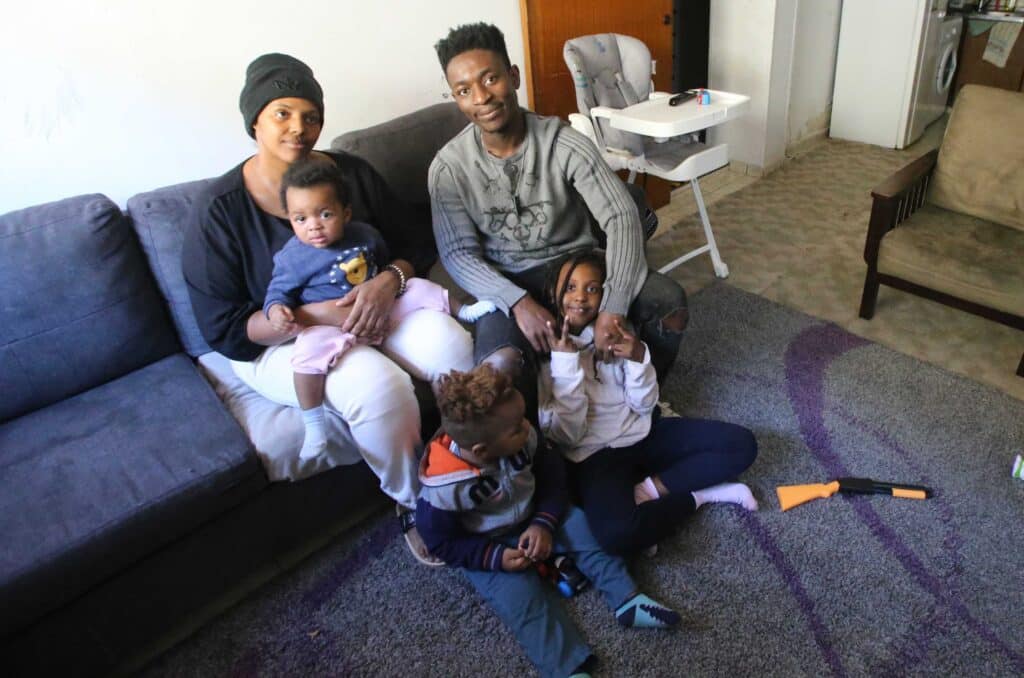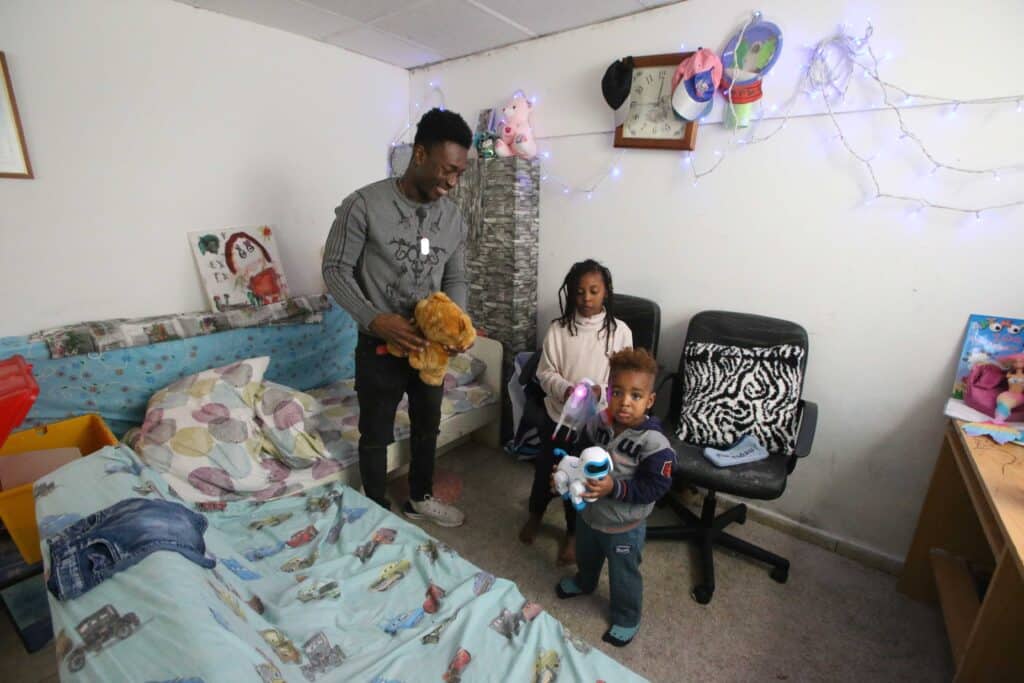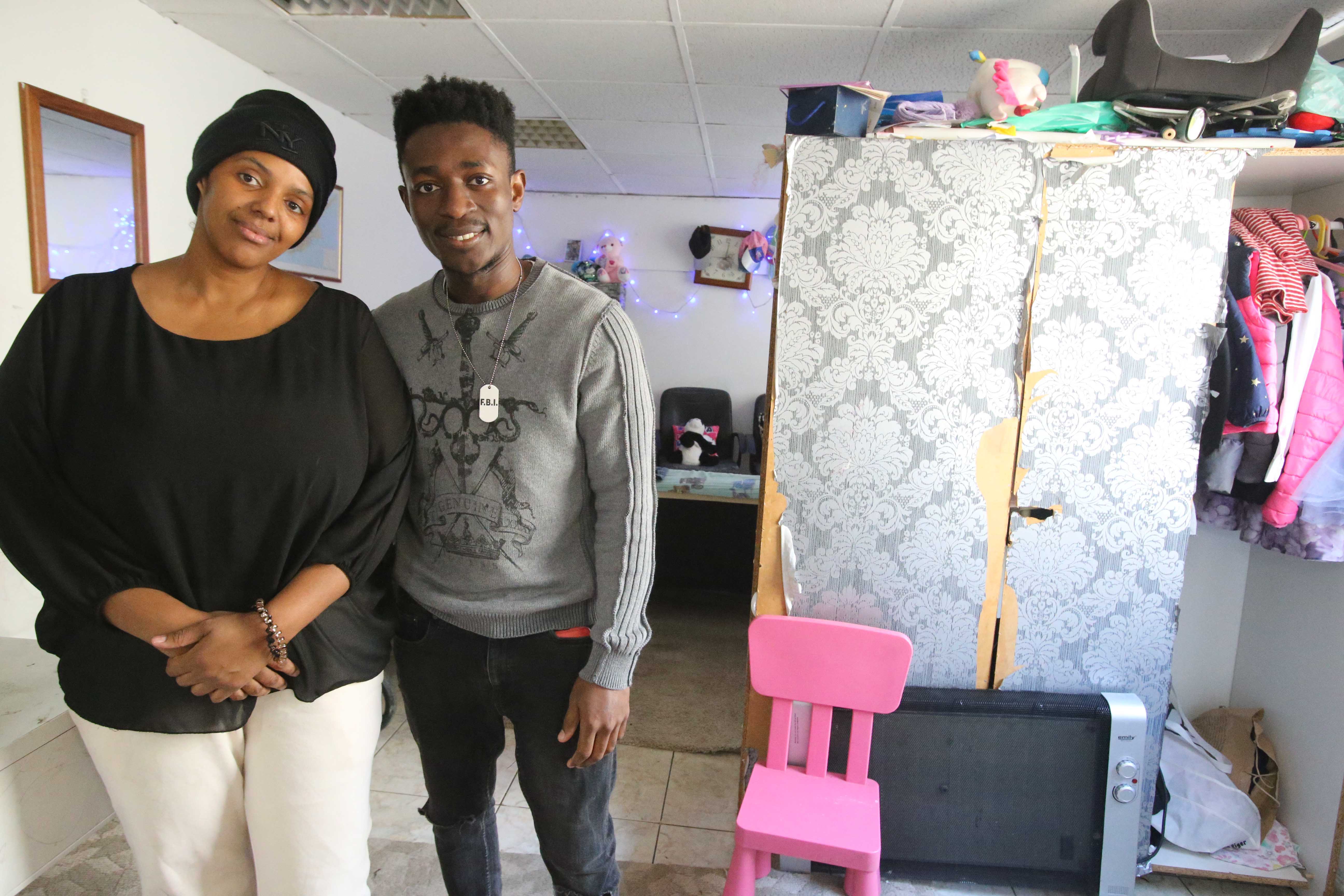At a time of year when cynicism should be put to one side, THEO PANAYIDES meets an African couple faced with deportation who love Cyprus but not the human cost of the system’s policies
Christmas is a time to help the needy. I meet Kamga Kengne, Hobo Suleban and their three children through the excellent ‘Adopt a Family for Christmas’ programme run by the awkwardly-named Pancyprian Volunteerism Coordinative Council (PVCC). It’s a statement of support more than a programme, a one-off cheque for €100; it helps a little – it lets them do something special for Christmas – but only a little. The Council’s larger contribution is perhaps in helping the couple’s oldest child, seven-year-old Melina, with her Greek at school; unlike other foreign kids at the school, Melina didn’t go to kindergarten – things were “really rough”, and it was impossible to send her – so she spoke only English when she joined.
Does she have friends?
“She has. She has friends. But sometimes the kids from the school call her ‘nigger’, ‘you are black’. Yes, it’s true,” admits Hobo. “There’s a lot of racism in Cyprus, but there are a lot of good people at the same time.
“But we are not racist. We never call [someone] ‘you are white’ or ‘you are this’.”
“We’re just trying to survive,” adds her husband, and chuckles dryly. “We’re just trying to survive.”

The family in their rented accommodation
Christmas is a time for letting go of one’s cynicism. Just as warring armies during WWI put down their guns and joined in a Christmas truce – even while knowing they’d go back to killing each other a few days later – so it should be possible to withhold the usual bitterness and suspicion when it comes to migrants. I can already hear people saying ‘Go back where you came from, if you don’t like it’ in response to complaints of racism. I can already hear the sneers of ‘That’s what they all say’ in response to the couple’s hard-luck stories in their respective homelands. (Hobo’s from Somalia, Kamga from Cameroon.) Admittedly, there’s no way of knowing for sure if they’re telling the unvarnished truth or exaggerating for sympathy – but it shouldn’t be necessary to obtain documentary proof in order to feel compassion. In any event, they’re here – and they are indeed trying to survive, negotiating a system that keeps throwing barriers at them, and may yet end up crushing them.
We’re halfway through the interview when Hobo drops her bombshell. Before that, we speak mainly of the past – why they had to leave, how they got here. At the very end, we speak of the future, or at least the hopeful potential future if everything goes well.
“I have a lot of companies in Cyprus who need me,” says Kamga, who’s been to university (he studied electrical engineering at the University of Bandjoun) and is also bilingual, French and English. “I did some interviews, like 3CX, or XM in Limassol” – 3CX is a tech company, XM is forex – “and they say ‘Yes, you have the background and the knowledge we want’.” At 3CX, “Madame Ruth” was very positive during their Zoom interview; XM “proposed him [a salary of] €2,000,” says Hobo proudly. It’s a common misconception that African migrants must come from poverty, but in fact many are middle-class (or they couldn’t have afforded to come here); his father was “like a manager in Guinness Cameroon,” he tells me.
Kamga’s dad was killed by soldiers in 2008, when Kamga was 14. (He’s now 29; Hobo is 31.) He wasn’t targeted specifically; the whole family seem to have been in a crowd that was fired upon by the army, part of the ongoing strife in their part of the country. “He was not the only one who died that day,” he recalls. “I was very small, so it was very traumatising for me. And I was with my mum, all the blood everywhere. We tried to shake him, but already it was very late. So he passed away.”
That’s not why he himself had to leave Cameroon, though. Some years later, unable to find a job after college, he joined a local NGO called Justice pour Tous (Justice for All) which tried to expose the truth about the army’s atrocities, working with foreign groups like Human Rights Watch. This was dangerous work (it’s unclear if he chose it because of what had happened to his father), especially in what he calls a “difficult” country.
“I saw it already, even with the people that I was working with – I saw two or three, they’re dead already, they killed them”. Kamga himself was abducted, and shows me a mark on his forehead where he says he was beaten with rifle butts. “I was also wanted in my country,” he begins, then checks himself: “Not ‘was’ – I am! Until now, I’m wanted inside my country.” He fled with just a small bag, and came to Cyprus in April 2019.
Hobo had already arrived four years earlier. (Melina isn’t Kamga’s biological child, unlike her two half-siblings, a two-year-old boy and a one-year-old girl.) Her story differs slightly, if only because Somalia – which has been in a state of anarchy since the 90s – makes Cameroon look positively idyllic. She doesn’t come from a middle-class family, in fact she never knew her parents (she was only told that they had died), raised by an auntie in a village near Mogadishu.
“I had a lot of problems when I was young. I didn’t grow up normally, or go to a steady school.” She was molested as a girl, then forced into marriage at 15. “That’s why I didn’t even teach my daughter, she doesn’t speak Somali – at all. I don’t want her to go back to Somalia, I don’t want her to have anything to do with it. Also, I – you know what’s meaning ‘FGM’?” Female genital mutilation, cutting the vulva for no medical reason except to control women’s sexuality and discourage them from having sex. “They are closing, actually, the place that God opened for you.”

The couple have made the house into a home
Bad memories hang in the air in the little flat on the outskirts of Nicosia, leavened by the sounds of children’s laughter and the incongruous addition of Phil Collins crooning ‘One More Night’ (a Classic Soft Rock playlist plays on TV, presumably for my benefit). It’s a ground-floor flat, behind a coffee shop; I suspect it may once have been the back of whatever shop was there previously. The walls are mostly blank, decorated with a touch of desperation: a small mirror, a map of Cyprus, a sign reading ‘Happy Halloween’. There’s a bedroom with a single tiny window, one corner of the ceiling swollen with mould; the room holds a double bed, where the couple sleep with the baby, and a cot for the middle child; Melina sleeps in the living room. The rent is €450 but the landlord, Mr. Stelios (“a very good man”), doesn’t pressure them too much; they actually owe a few months’ worth – which is just as well since the only money coming in (apart from occasional help from the church and the PVCC) is the €875 Kamga gets for working in a restaurant.
Hobo doesn’t work; she has to stay home with the babies. They have no support system, and daycare isn’t free (though a government programme exists to pay half of it). Guaranteed minimum income (GMI) is another option, but the wheels of the system grind slowly: “We already applied for that one – it’s going like two years now”, but they’re still waiting. She tried a job in McDonalds three months ago, working a night shift while Kamga took care of the kids – but then “after he left to go to work, the other two babies wake up. I can’t sleep. Mentally I’m not okay now, I’m taking pills,” she sighs, and shows me a doctor’s note allowing her sick leave for “anxiety and depressive illness”.
Kamga, meanwhile, frets about being unable to provide for his family – and the stress of having to keep his frustration bottled up: “You don’t show them, the kids, that inside you are not happy,” he explains wearily. “Even when you finish your workplace and you cross this door, you have to say ‘Hey, how are you, my kid?’ – you have to enjoy with them. But inside, you are dying. To be honest, you are dying.”
Still, at least he’s making a salary, not to mention those good jobs in forex and tech just around the corner – but then here comes the bombshell, the real situation as explained by Hobo halfway through our interview. She herself is a recognised refugee, having secured her status in 2020; her husband, however, is still an asylum seeker – and, despite his NGO work and very real risk of being killed if he goes back, his application has actually been rejected. He’s appealing the decision, received legal aid in September (eight months after applying for it) and has a hearing coming up next month – but, if he loses the appeal, deportation is a real possibility.
Surely they wouldn’t throw out a family man, though?
“I saw in Nicosia,” he claims, “in the centre of town, most of the African people got arrested and they have an appeal in the court. They arrest them, they send them back. They put them in Menoyia [detention centre], and they send them back. This is the problem we have in Cyprus.” It’s this new interior minister trying to crack down on migrants, I note sympathetically. Maybe so, shrugs Kamga – but “he doesn’t try to know who is real and who is fake”.
“Every day I’m feeling worried,” laments his wife. “What time they will catch him to send him back to Cameroon. And this house – we’ll lose the house. I will be homeless. I will owe the landlord. If they send him back today, we can’t pay the rent… I would be alone.” Not to mention that being forced back to Cameroon would mean serious trouble: “Even in the airport, the first day,” he ponders, “when they will see my fingerprint…”
“They’ll say ‘Arrest him! This guy!’” adds Hobo grimly.
It sounds extreme, breaking up a family, but apparently it’s not uncommon. Kamga estimates there might be 200 people in his position in Cyprus. Hobo mentions a fellow Somali whose husband came to join her and was later deported, leaving her alone (she ended up moving to Holland) with five kids.
‘Was it necessary to have all these kids, though?’ I ask, and they look a bit abashed. The plan, in their case, was to have a second one, as a playmate for Melina; the third was an accident. Hobo adds something interesting, namely the cultural factor: in Somalia, once a girl reaches child-bearing age she’s expected to start breeding – but now, through watching movies and seeing life in the West, she understands that it’s different here, and plans to raise her daughters accordingly. It’s another misconception that migrants don’t assimilate – but she, at least, seems to have definitively turned her back on her mother country.
She even had to convince Migration that she is, in fact, Somali, since she wasn’t dressed like most of her fellow Muslims (Kamga is Christian, another reason why they could never go back to either of their homelands together): “It’s true, I don’t wear hijab – because I don’t like it. I like to be free… The reason why I love Cyprus is, first, I get freedom. Secondly, I know if I am a woman, I have rights. I didn’t have rights when I was in Somalia. Always it’s man. Always, it’s man.”
She may indeed love Cyprus – but alas, the system is another matter. “I’m begging the government to try and understand our situation here,” pleads Kamga. “I beg the Migration every day.” He’s written to the interior minister, to no avail. “European law says you can’t separate the father,” he adds desperately. “Because a kid needs both parents.” (“I need you as well,” puts in Hobo.) She, meanwhile, has been waiting for Welfare to inspect the house (and hopefully give them an extra bed) for a year now, since the youngest child was born: “Until now, the lady did not come to visit me”. Partly it’s the usual bureaucracy, but it’s also more than that: our government makes no secret of the fact that it’s actively trying to promote Cyprus as an unattractive destination for asylum seekers. Sending someone like Kamga back would presumably be a plus, serving as a cautionary tale – but this policy also has a human cost. Hobo and Kamga are the human cost.
There’s an addendum, a few days after our interview. The deputy ministry of social welfare finally replies, informing the couple that their application for GMI has been rejected. I decide to find out more; after all, if anyone should be eligible for Guaranteed Minimum Income, a family of five, with two babies, on a monthly income of €875 – well below the minimum wage – should fit the bill. Security turns me away at the door (it’s by appointment only), so I leave my number; they say they’ll call me, but haven’t yet. Driving home, I recall Kamga’s melancholy phrase: “Inside, you are dying. To be honest, you are dying”. I recall Hobo too, though her English name – the one she uses at work, trying to assimilate better – seems perhaps more appropriate: Hope.







Click here to change your cookie preferences